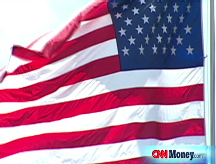Your tax bill on the line
Financial crisis has taken center stage, but the candidates still pushing their tax plans.
NEW YORK (CNNMoney.com) -- Tax breaks, tax breaks, tax breaks. For months now, Barack Obama and John McCain have promised voters that they will lessen the financial burden on Americans - even as the economic crisis worsens and the country racks up record deficits.
McCain, who wants to extend President Bush's tax cuts for everyone, says repeatedly that now would be the worst time to raise taxes.
"Raising taxes makes a bad economy much worse," McCain said last week. "Keeping taxes low creates jobs, keeps money in your hands and strengthens our economy."
Obama, who would repeal some of the Bush tax cuts but only for the highest income taxpayers, says now more than ever the middle class needs help.
"If you make under $250,000, you will not see your taxes increase by a single dime - not your income taxes, not your payroll taxes, not your capital gains taxes, nothing," Obama said last week. "Because the last thing we should do in this economy is raise taxes on the middle class."
Even before the financial meltdown, budget experts were expressing concerns about the cost of both candidates' tax proposals - which go well beyond just extending tax cuts enacted under Bush.
The nonpartisan Committee for a Federal Budget, excluding the tax-related parts of the candidates' health care proposals, estimates that McCain's tax plans could increase the federal deficit by over $400 billion annually by 2013 and Obama's could increase it by $360 billion.
On top of that, they have both called for additional temporary tax cuts to be put in place as part of any economic stimulus package that lawmakers might consider in the coming weeks or months to jolt the economy.
Are the candidates' promises realistic, and how would their proposed changes affect taxpayers?
How successful the next president will be in making any or all of his tax proposals a reality turns on several factors: the state of the economy, how willing foreigners are to buy the country's debt given its growing deficit, and how supportive Congress will be.
Deficit hawks say the country would be unable to afford either candidate's plan because the federal deficit, which could approach $1 trillion next year, is ballooning. If anything, the next president might get some of his tax proposals through if he can wrap them into an economic stimulus proposal, said Maya MacGuineas, president of the Committee for a Federal Budget.
But MacGuineas said beyond that she believes all bets are off, if the next president tries to pay for new tax cuts by borrowing more money from foreigners rather than cutting spending or raising revenue. Even if lawmakers have the stomach to borrow more, buyers of U.S. debt may demand a higher interest rate.
"The political opportunity for borrowing will shut after the stimulus train leaves the station. Then the budget numbers will look daunting," MacGuineas said.
Political observers aren't so sure.
For the next two years, "budget discipline is on the back burner," said Brian Gardner, the Washington analyst for investment firm KBW. Unless the economy gets up and running again in short order, lawmakers will not be wedded to so-called "pay as you go" policies, he said.
As for borrowing more? "Concern over higher rates will not be driving policy, at least in 2009," Gardner said.
The next president - McCain or Obama - will enter the Oval Office toting a long list of promised tax changes.
McCain wants to make all of the Bush tax cuts - enacted in 2001 and 2003 - permanent.
In addition, McCain wants to increase the exemption for dependents, lower the corporate tax rate, make expensing rules more generous for small businesses and lessen the bite of the estate tax and Alternative Minimum Tax.
Obama wants to maintain the tax cuts for everyone except for singles making more than roughly $200,000 and married couples making more than $250,000.
Further, Obama wants to offer new tax breaks for lower- and middle-income groups. For example, he would expand the earned income tax credit; give those making less than $150,000 a $500 tax credit per person on the first $8,100 in income; offer those making under $75,000 a 50% federal match on the first $1,000 of savings; and exempt seniors making less than $50,000 from having to pay income tax.
And Obama would lessen the bite of the estate tax and the Alternative Minimum Tax - like McCain would, but to a lesser degree.
The net effects? Under McCain's plan, every income group, on average, would see a tax cut. Upper-income earners would see the largest breaks both in dollars and as a percentage of their current after-tax income, according to the latest estimates from the Tax Policy Center.
Under Obama's plan, upper-income earners are the only ones who would see a tax increase. Low-income earners would see the biggest benefit as a percentage of their current after-tax income. ![]()





